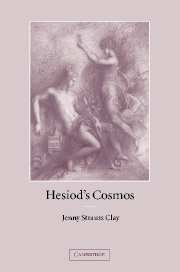Book contents
- Frontmatter
- Contents
- Preface
- Acknowledgments
- List of abbreviations
- Introduction
- 1 Orientations: the Theogony
- 2 Orientations: the Works and Days
- 3 Overtures
- 4 The origins and nature of mankind
- 5 The two Prometheuses
- 6 Perspectives on gods and men
- 7 Hybrids
- Conclusion: Hesiod and Calchas at Aulis
- Bibliography
- Indexes
Introduction
Published online by Cambridge University Press: 04 August 2010
- Frontmatter
- Contents
- Preface
- Acknowledgments
- List of abbreviations
- Introduction
- 1 Orientations: the Theogony
- 2 Orientations: the Works and Days
- 3 Overtures
- 4 The origins and nature of mankind
- 5 The two Prometheuses
- 6 Perspectives on gods and men
- 7 Hybrids
- Conclusion: Hesiod and Calchas at Aulis
- Bibliography
- Indexes
Summary
The present study constitutes a complement to my earlier work on Homer and the Homeric Hymns. My approach and focus here is similar: an examination of what I call early Greek theology. I mean by that term the speculation inherent in those works concerning relations between gods and men and, since those relations have changed in the course of time, their evolution to the world's present state. Unlike other ancient societies, the theology of the ancient Greeks was developed neither by priests nor holy men, but by the poets. These, in turn, did not expound dogma or religious doctrine, but recounted myths about the gods as well as stories of the famous deeds of the heroes of old. Heroic epic describes the actions of those semi-divine mortals who belong to an era prior to ours when a greater intimacy with the gods obtained. The narratives of the Homeric Hymns trace the evolution of the Olympian pantheon after Zeus becomes king of the gods. By recounting the origins of the cosmos up to the accession of Zeus in the Theogony and by explaining the age of iron in which we live in the Work and Days, the Hesiodic poems both frame and fill out the mythic history of both gods and mortals. Thus, they form part of a larger whole constituted by early Greek hexameter epos.
- Type
- Chapter
- Information
- Hesiod's Cosmos , pp. 1 - 11Publisher: Cambridge University PressPrint publication year: 2003
- 1
- Cited by



